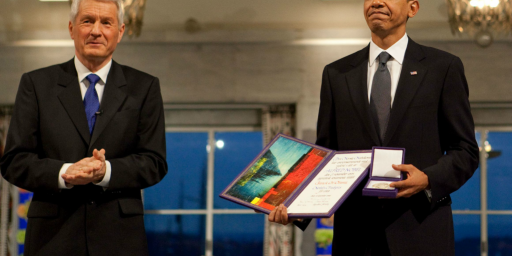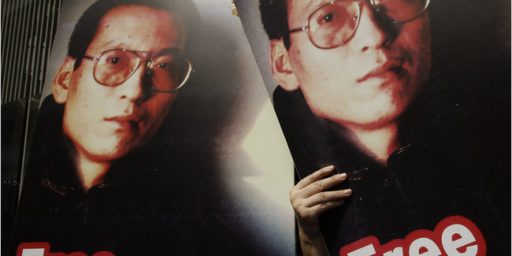How to Win a Nobel Prize
CNN offers some suggestions for those hoping to win a Nobel Prize one day.
Obscurity: Nobel Prize winners, in the fields of science and literature at least, are the celebrity equivalent of dark matter — the chances of becoming one increase significantly in inverse proportion to the complexity and obscurity of your work. So posing on red carpets or inside the pages of trashy sleb-mags is a no-no. This week’s winners have included Roger D. Kornberg, recognized for his work on “the molecular basis of eukaryotic transcription,” and John C. Mather and George F. Smoot “for their discovery of the blackbody form and anisotropy of the cosmic microwave background radiation.” You must cultivate a quiet career in the backwaters of microbiology or compose long, indigestible works of literature. A middle initial also seems to help.
Bluff it: The key to Nobel success is that nobody should understand anything at all about what you do. Maybe you don’t understand either, but that doesn’t really matter. At the end of the day, all you have to do is convince somebody else that what you do is REALLY IMPORTANT — something any scientist who has ever written a grant proposal could do in their sleep. Remember though that many Nobel winners are not recognized for decades after conducting the key experiment for which they will ultimately be recognized. So you’ll probably have to get used to conversations in which people’s eyes glaze over the second you start describing your ground-breaking work — and then make their excuses.
Do something useful: Obscurity is fine, but ultimately you’re more likely to get the nod if you can actually offer some evidence that your work actually matters. Think dull but worthy: global warming is big news at the moment so solving climate change or the forthcoming energy crisis should score you a few points. Incurable diseases are always a popular area. More fantastical schemes dreamed up by mad scientists in white coats — cloning dinosaurs, time machines, megalomaniacal supercomputers concealed within island lairs, say — have traditionally been less successful.
Peace, man: The Peace Prize is the biggie, yet, arguably, it’s the easiest one to win, since it’s the only one open to mere mortals, sparing you the poverty, tedium and in-house politics of an academic career. Standards have been patchy over the years, but, then again, Alfred Nobel invented dynamite so he was obviously having a chuckle to himself when he dreamt this one up. The definition of peace also seems to have been applied extraordinarily loosely over the years. Previous nominees include Hitler, Mussolini and Stalin (twice!) — an unholy triumvirate whose contribution to world peace might perhaps generously be described as misguided. Famously, U.S. Secretary of State Henry Kissinger won the prize in 1973 with the Vietnam War still raging — prompting Tom Lehrer’s famous line that “satire had died.” If you can bring love and harmony to the Middle East, solve global poverty or rid the world of nuclear weapons you’re a shoo-in — but you’ll just to have join the line behind all the former presidents, politicians and rock stars waiting to have a crack at that little lot.
Move to the U.S. and, if necessary, have a sex change: Anyone can win a Nobel Prize, but the statistical truth is that you stand a far higher chance of becoming a Nobel Laureate if you’re American. And a man. Prior to 2006, 758 individuals and 18 organizations have been honored by the Nobel Foundation and almost 300 of those recipients have been American. For women though the figures look even worse. There had been just 33 female winners since 1901 — and Marie Curie won two of those on her own.
The last, at least, continues to hold: Several American men have been awarded Nobel prizes in the sciences the last couple of days.






Several American men have been awarded Nobel prizes in the sciences the last couple of days
Kinda makes you wonder what the Sumners protests were all about.
Sorry, but I just find this CNN piece to be relentlessly, annoyingly dumb.
Even the highlighted last point. That Americans, and men, have won the majority of the prizes does not mean that being American or a man will increase your probability of winning. Unless their is a claim that Americaness and maleness are significant factors used in choosing the winners. That doesnt seem to me to be the case, given that the winners are those who have clearly done interesting, understandable, and fundamental work in their respective fields (contra all the other points in this absurd piece), and thus clearly deserving.
Is it just me or does this not make sense? “Nobel Prize winners, in the fields of science and literature at least, are the celebrity equivalent of dark matter — the chances of becoming one increase significantly in inverse proportion to the complexity and obscurity of your work. So posing on red carpets or inside the pages of trashy sleb-mags is a no-no.”
If your chance of becoming a winner increases in inverse proportion to your obscurity, you would want to be as inobscure as possible, right? Otherwise you’re just talking about regular ol’ proportion. I think they just threw the word “inverse” in there because it sounded good, but it changes the whole meaning of that sentence. Someone at CNN needs to learn to edit.
The key to Nobel success is that nobody should understand anything at all about what you do.
This statement says more about its author than about the Nobel winners. The cosmic microwave background work, at least, is about as straighttforward and easily understood as one could hope for a modern scientific discovery to be.
But then, we already had ample evidence that CNN is a coven of idiots.
A Nobel Prize to an Artist, is a priority for the Nobel Prize Committee, 2007. If not so, just drop the whole concept of the Nobel Prize, as whole!
http://www.cordially.homestead.com/
Cheers
Al